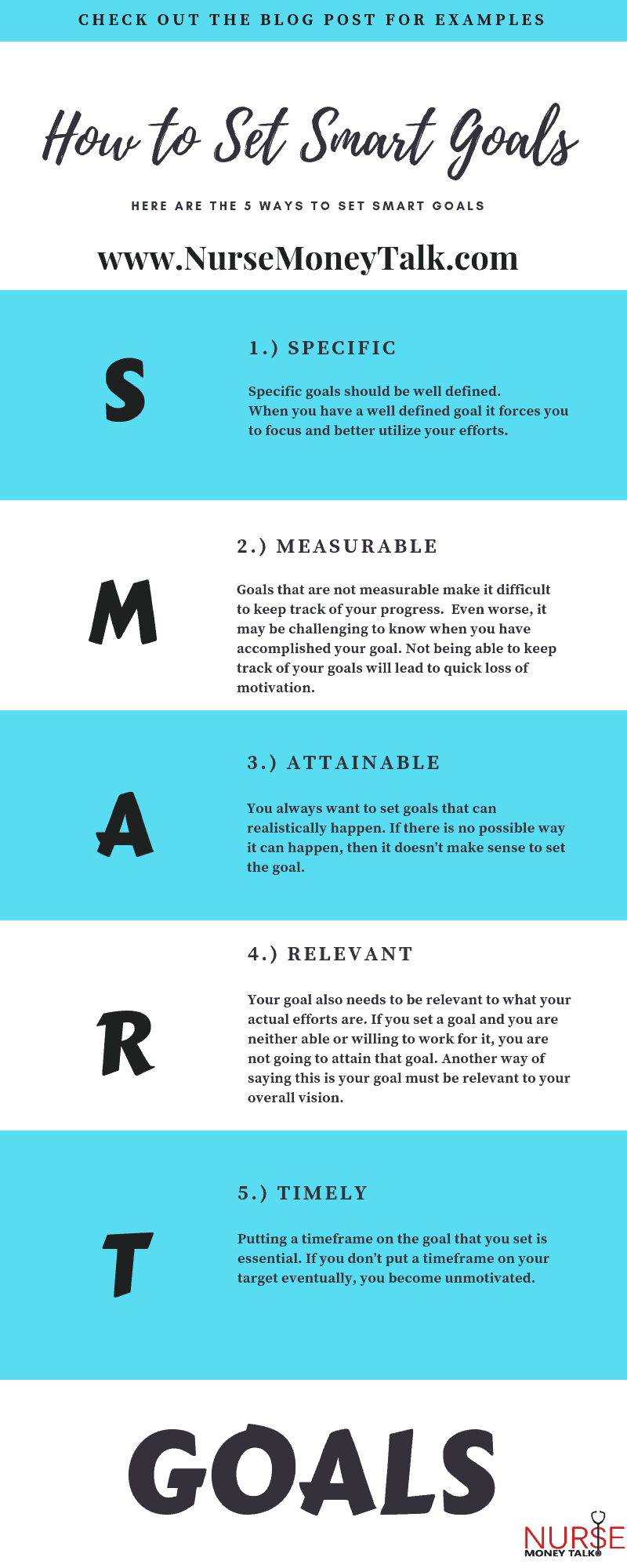This articles going to teach you about smart goal setting in the nursing profession.
Before we get into how to set nursing smart goals lets first talk about the why. Specifically why smart goal setting in nursing is important.
Why is Goal Setting in Nursing Important?
Often overlooked, goal setting is a critical piece for success in your career as a staff nurse, nurse leader and honestly life in general.
Goals encourage success, and setting individual or team goals for your subordinates can motivate them and you to accomplish things you otherwise wouldn’t.
Here are five reasons why it’s so important.
1. Forces You to Focus
Alexander Graham Bell said,
“Concentrate all your thoughts upon the work at hand.The sun’s rays do not burn until brought to a focus.”
Alexander Graham Bell
Goals force you to hone in on a target and gives your activities a sense of purpose. Setting goals give you a direction to concentrate your efforts.
2. You Know When You Accomplish Something
Setting nursing goals let you know when you have accomplished something. For example, if you say “I want to be a good runner.”
How do you know when you have finished that task?
Without setting a clear goal, you don’t know. If instead, you say “I want to run a mile in 10 minutes” you set a clear expectation of what your goal consists of.
3. You Make Large Tasks Easier to Achieve
Have you heard of the proverb
“how do you eat an elephant…one bite at a time?
As silly as that quote is there is a lot of truth in it. Difficult tasks can be overwhelming if they are not broken down.
Take a similar example from above. Let’s say you have a goal to run a marathon. A marathon is 26.2188 miles (source). To most that would be a daunting task.
However, what if you divided it down to one mile, then five miles and then worked up from there? Pretty soon you would achieve that marathon one mile at a time.
4. Goals motivate and Keep You Accountable
Clear and appropriate feasible goals can drive and keep you moving forward. Continuing with the example above, say you did break up your goal of running a marathon into smaller mile increments.
After you accomplish a one-mile goal, then the three-mile goal, then five-mile goal and so forth you will become energized because you hit those goals.
Achieving those goals lead to a feeling of accomplishment and encourages you to move forward toward the end goal.
5. Goals Keep You Accountable and Give Feedback
Appropriate goals are excellent at giving you feedback and being an honest critique. At the end of the day, you either met the target or you did not.
Not reaching a goal can give you valuable information and can show you areas where improvement is needed.
The running example used is an easily relatable goal, but the principles apply broadly to just about anything.
- Are you trying to write a paper?
- Are you trying to finish a big project for work?
- Are you trying to make a significant personal or career change?
Goal setting is vital for achieving success in those areas.
How to Write a SMART goal in Nursing Profession
You now understand the importance of setting goals for yourself. You may now be asking, “what’s the best way to set goals?”
You’re in luck, I have the answer for you. The best way to set goals in nursing is to use the S.M.A.R.T acronym.
The SMART acronym stands for setting goals that are
- Specific
- Measurable
- Attainable
- Realistic
- Timely
#1. SPECIFIC
Specific goals should be well defined and easy for even an outside person to know what you are talking about.
When you have a goal that’s specific, it forces you to focus and better utilize your efforts.
In other words, you never have to second guess or wonder what you’re aiming for.
SMART Nursing Goals Example (lousy goal setting example):
Jane has set a goal to move up and become a leader after graduating school.
In the example, it’s not completely clear what Jane is aiming for.
SMART Nursing Goals Example (better goal setting example):
Jane wants to acquire experience, so she can become a chief nursing officer at Generic Hospital.
In this example, it’s clear what Jane’s goals are. Because Jane made a specific goal, she knows precisely what she is aiming for.
That’s how to set a smart goal.
#2. MEASURABLE
Here’s a question.
If you set goals, how do you know when you have accomplished those goals? If the answer is “I don’t know” then you’re probably making goals that are not measurable.
Goals that aren’t measurable make it difficult to keep track of your progress. Even worse, it may be challenging to know when you have accomplished your goal.
Not being able to keep track of your goals will lead to a quick loss of motivation.
To help make your goal measurable, try to quantify it.
Nursing Goals Example (bad example)
John has set a goal for himself to be able to run by the end of summer.
In the above example, how do we know when John has accomplished his goal?
- Is it after he runs 10ft?
- Is John trying to run a mile or two miles?
- What if he is trying to run a marathon by the end of the summer.
In the above example, the goal doesn’t give us a way to measure progress. In the end, we won’t know when John accomplishes his goal.
The result is John will probably lose motivation and quit. What if John said this instead:
Nursing goals example (an excellent example of goal setting)
John has set a goal for himself. He wants to run 1-mile in 15 minutes by the end of the summer.
That’s how you set a smart goal that is measurable.
#3. ATTAINABLE
You always want to set realistic goals. If there is no possible way it can happen, then it doesn’t make sense to set the goal.
SMART goals example (bad example of goal setting):
Jim wants to lose 20 pounds in a week.
Realistically are you going to lose 20 pounds in a week?
It’s highly unlikely. Therefore that goal is unrealistic. A better goal would be:
SMART goals example (a good example of goal setting):
Jim wants to lose one pound in a week.
That’s how you set a smart goal that is realistic.
#4. RELEVANT
Your goal also needs to be relevant to what your actual efforts are.
If you set a goal and you are neither able nor willing to work for it, you’re not going to attain it.
Another way of saying this is your goal must be relevant to your overall vision.
SMART Nursing Goals Example (a lousy example of goal setting)
Johnny just graduated from school and landed his first nursing job.
Long-term he doesn’t see himself in leadership.
He has set a goal to become a manager as soon as possible.
Setting a goal to be a manager is not consistent with a long-term vision that doesn’t include leadership. Instead, you want your goals to be centered around what your long-term vision is.
That’s how you set a SMART goal that is relevant.
#5. TIMELY
Putting a time frame on the goal you set is essential. If you don’t put a timeframe on your target, you will eventually become unmotivated.
SMART Nursing Goals Examples (bad example):
John made a goal for himself. He wants to save $1000.
In the example above, we don’t know when John needs to have the money saved. Without knowing that piece of information, it’s hard to measure progress. It’s likely John will not be as motivated without a timeframe.
SMART goals example (good example)
John has set a SMART goal. He wants to have $1000 saved in 2 months.
That’s how to set a SMART goal that is timely.
SMART Goals Examples
- John’s SMART goal is to learn how to ride a bicycle by the end of the summer.
- Samantha has a SMART goal which is to graduate college with her nursing degree in four years.
- Jimmy has a goal which is to lose 10 pounds in two months.
Proper goal setting can either be a cornerstone for motivation or a drain on motivation.
It does take more work and planning initially. In the long run, setting SMART goals for yourself will pay off.
Frequently Asked Questions
1. What does SMART Stand For?
As mentioned earlier SMART stands for:

- Specific,
- Measurable,
- Attainable,
- Realistic,
- Timely.
2. What are some Goals for Nursing?
There are a lot of goals nurses can and should strive for. Some examples could involve
Career Nursing Goal
- By the end of the year, I’m going to find a mentor.
- Before this year is over I’m going to attend at least one nursing conference.
- I’m going to study and get my CCRN certification by the end of next year.
- I’m going to improve my charting skills by the end of the year so I stop staying late at work.
- I’m going to find a low-stress nursing job by the end of the year.
Personal Nursing Goal
- Before this month is over I’m going to find a hobby I enjoy doing.
- I’m going to start going to the gym 3 times a month by the end of April.
- I’m going to start a nurse side-hustle by January 1st.
- I’m going to pay off my nursing school loans 2 years early.
School Nursing Goals
- I’m going to pass the NCLEX the first time I take it.
- I’m going to buy everything I need for nursing school before July 30.
What goal have you set using the SMART acronym?
If you enjoyed this article, please share it so we can get the word out and educate others.
Related Articles on SMART Goals Nursing
Pin it!


